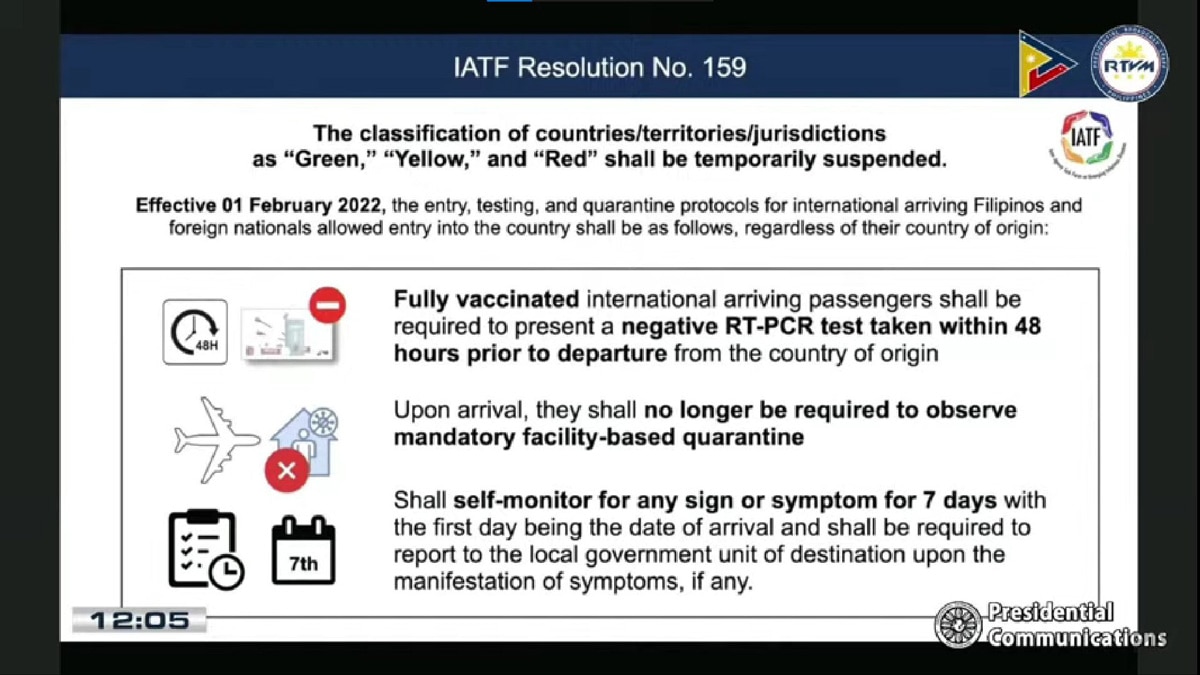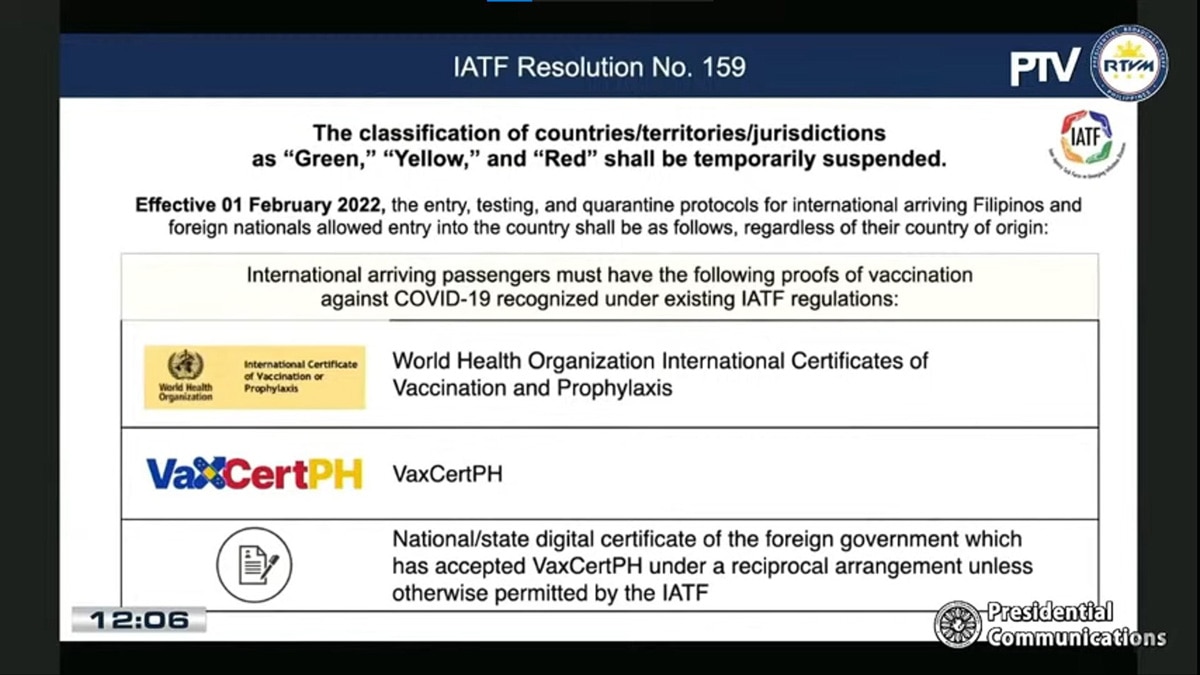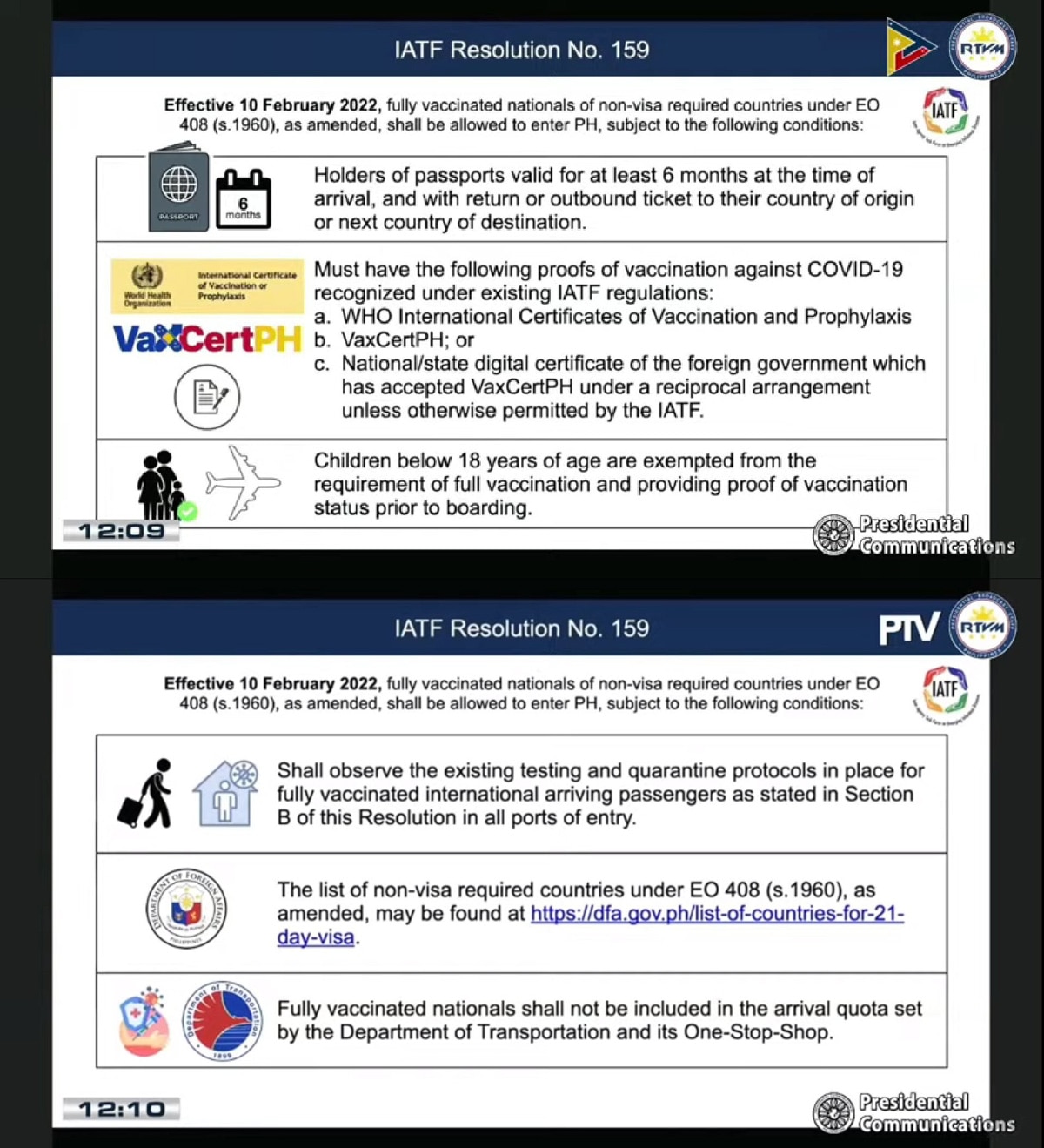Philippines drops quarantine for vaccinated travelers, returning OFWs | ABS-CBN

Welcome, Kapamilya! We use cookies to improve your browsing experience. Continuing to use this site means you agree to our use of cookies. Tell me more!
Philippines drops quarantine for vaccinated travelers, returning OFWs
Philippines drops quarantine for vaccinated travelers, returning OFWs
Mico Abarro,
ABS-CBN News
Published Jan 28, 2022 01:19 PM PHT
|
Updated Jan 28, 2022 02:47 PM PHT
MANILA (UPDATE) - Fully-vaccinated international travelers and returning overseas Filipinos are no longer required to undergo facility-based quarantine, but must test negative for COVID-19 and self-monitor for symptoms, the government announced Friday.
MANILA (UPDATE) - Fully-vaccinated international travelers and returning overseas Filipinos are no longer required to undergo facility-based quarantine, but must test negative for COVID-19 and self-monitor for symptoms, the government announced Friday.
The Philippines has also suspended its "green," "yellow," and "red" COVID-19 risk classifications for countries, territories and jurisdictions, said acting Presidential Spokesperson and Cabinet Secretary Karlo Nograles.
The Philippines has also suspended its "green," "yellow," and "red" COVID-19 risk classifications for countries, territories and jurisdictions, said acting Presidential Spokesperson and Cabinet Secretary Karlo Nograles.
Starting February 1, 2022, the Philippines would follow the following protocols in the entry of international arriving Filipinos and foreign nationals, regardless of their country of origin:
Starting February 1, 2022, the Philippines would follow the following protocols in the entry of international arriving Filipinos and foreign nationals, regardless of their country of origin:
- Fully vaccinated international arriving passengers shall be required to present a negative RT-PCR test taken within 48 hours prior to departure from the country of origin.
- Upon arrival, they shall no longer be required to observe mandatory facility-based quarantine.
- Shall self-monitor for any sign or symptom for 7 days with the first day being the date of arrival and shall be required to report to the local government unit of destination upon the manifestation of symptoms, if any.
- Fully vaccinated international arriving passengers shall be required to present a negative RT-PCR test taken within 48 hours prior to departure from the country of origin.
- Upon arrival, they shall no longer be required to observe mandatory facility-based quarantine.
- Shall self-monitor for any sign or symptom for 7 days with the first day being the date of arrival and shall be required to report to the local government unit of destination upon the manifestation of symptoms, if any.
Nograles said international travelers must prove they are fully-vaccinated against COVID-19 by presenting either World Health Organization International Certificates of Vaccination and Prophylaxis, VaxCertPH, or National/State digital certificates from foreign governments which also accept VaxCertPH in a reciprocal arrangement, unless otherwise permitted by the Inter-Agency Task Force on Emerging Infectious Diseases.
Nograles said international travelers must prove they are fully-vaccinated against COVID-19 by presenting either World Health Organization International Certificates of Vaccination and Prophylaxis, VaxCertPH, or National/State digital certificates from foreign governments which also accept VaxCertPH in a reciprocal arrangement, unless otherwise permitted by the Inter-Agency Task Force on Emerging Infectious Diseases.
ADVERTISEMENT
The unvaccinated, partially vaccinated, or individuals whose vaccination status cannot be independently validated will have to present a negative RT-PCR test result taken within 48 hours before leaving their country of origin.
The unvaccinated, partially vaccinated, or individuals whose vaccination status cannot be independently validated will have to present a negative RT-PCR test result taken within 48 hours before leaving their country of origin.
They will however have to undergo facility-based quarantine until the release of their negative RT-PCR test taken on the 5th day. Afterward, they will have to undergo home quarantine until the 14th day, with the date of their arrival being the first day.
They will however have to undergo facility-based quarantine until the release of their negative RT-PCR test taken on the 5th day. Afterward, they will have to undergo home quarantine until the 14th day, with the date of their arrival being the first day.
LGUs of destination and their respective Barangay Health Emergency Response Teams are tasked with monitoring arriving passengers undergoing home quarantine.
LGUs of destination and their respective Barangay Health Emergency Response Teams are tasked with monitoring arriving passengers undergoing home quarantine.
As for children below 12 years of age who can't be vaccinated, they will follow the quarantine protocol applied to the parent or guardian accompanying them. Nograles added those currently undergoing quarantine as of February 1, 2022 may avail of the aforementioned testing and quarantine protocols.
As for children below 12 years of age who can't be vaccinated, they will follow the quarantine protocol applied to the parent or guardian accompanying them. Nograles added those currently undergoing quarantine as of February 1, 2022 may avail of the aforementioned testing and quarantine protocols.
These decisions were based on the recommendations of the Task Force on COVID-19 New Variants, as well as the sub-technical working group on data analytics, said Nograles.
These decisions were based on the recommendations of the Task Force on COVID-19 New Variants, as well as the sub-technical working group on data analytics, said Nograles.
ADVERTISEMENT
Fully-vaccinated nationals of non-visa requiring countries under Executive Order 408, series of 1960 will also be allowed to enter the Philippines starting February 10, 2022. This essentially allows the entry of fully-vaccinated international travelers for business and tourism purposes as long as they come from countries provided for by the EO.
Fully-vaccinated nationals of non-visa requiring countries under Executive Order 408, series of 1960 will also be allowed to enter the Philippines starting February 10, 2022. This essentially allows the entry of fully-vaccinated international travelers for business and tourism purposes as long as they come from countries provided for by the EO.
This is provided they hold passports valid for at least 6 months at the time of arrival, as well as tickets back to their home countries or next country of destination.
This is provided they hold passports valid for at least 6 months at the time of arrival, as well as tickets back to their home countries or next country of destination.
They will also be required to present the same proofs of vaccination as other arriving international travelers, while observing the same testing and quarantine rules for fully-vaccinated international arriving passengers. Children below 18 years of age meanwhile are exempted from the requirement of full vaccination and providing proof of vaccination status before boarding their flights.
They will also be required to present the same proofs of vaccination as other arriving international travelers, while observing the same testing and quarantine rules for fully-vaccinated international arriving passengers. Children below 18 years of age meanwhile are exempted from the requirement of full vaccination and providing proof of vaccination status before boarding their flights.
Nograles explained this was supposed to be implemented on December 1, 2021, but the policy was suspended.
Nograles explained this was supposed to be implemented on December 1, 2021, but the policy was suspended.
"Makakabangon na po, makakabangon na po ang tourism industry. At makaka-contribute ito ng malaki sa trabaho, kabuhayan, economic growth ng ating bansa," Nograles said.
"Makakabangon na po, makakabangon na po ang tourism industry. At makaka-contribute ito ng malaki sa trabaho, kabuhayan, economic growth ng ating bansa," Nograles said.
ADVERTISEMENT
(Our tourism industry will be able to rise. This will also contribute greatly to jobs, livelihood, and the economic growth of our country.)
(Our tourism industry will be able to rise. This will also contribute greatly to jobs, livelihood, and the economic growth of our country.)
The acting presidential spokesperson also called on local government units whose economies are dependent on tourism to encourage their residents to get fully-vaccinated.
The acting presidential spokesperson also called on local government units whose economies are dependent on tourism to encourage their residents to get fully-vaccinated.
"Pag fully vaccinated ang tourism workers, ang ating mga empleyado, ang mga workers natin sa facilities, fully vaccinated ang mga bisita at fully vaccinated ang mga communities natin, kaya natin labanan itong COVID at kung ano mang variant ito."
"Pag fully vaccinated ang tourism workers, ang ating mga empleyado, ang mga workers natin sa facilities, fully vaccinated ang mga bisita at fully vaccinated ang mga communities natin, kaya natin labanan itong COVID at kung ano mang variant ito."
(If tourism workers, employees, workers at facilities are fully vaccinated, as well as visitors and our communities, we will be able to fight COVID and its variants.)
(If tourism workers, employees, workers at facilities are fully vaccinated, as well as visitors and our communities, we will be able to fight COVID and its variants.)
Meanwhile, by February 16, 2022 only fully vaccinated foreign nationals will be allowed to enter the Philippines.
Meanwhile, by February 16, 2022 only fully vaccinated foreign nationals will be allowed to enter the Philippines.
ADVERTISEMENT
Nograles however clarified that unvaccinated Filipinos, or those who are partially vaccinated against COVID-19, would still be allowed entry.
Nograles however clarified that unvaccinated Filipinos, or those who are partially vaccinated against COVID-19, would still be allowed entry.
"Pagdating sa Feb 16, absolutely whether EO 408, or whether non-EO 408 or whether ito yung mga foreign nationals na for certain exemptions natin because of their expertise or their technical expertise or knowhow na binibigyan natin ng pahintulot na pumasok, basta absolutely by Feb 16 ang pwede lamang pumasok na foreign nationals ay fully vaccinated po lamang," he said.
"Pagdating sa Feb 16, absolutely whether EO 408, or whether non-EO 408 or whether ito yung mga foreign nationals na for certain exemptions natin because of their expertise or their technical expertise or knowhow na binibigyan natin ng pahintulot na pumasok, basta absolutely by Feb 16 ang pwede lamang pumasok na foreign nationals ay fully vaccinated po lamang," he said.
(On February 16, absolutely whether EO 408, or whether non-EO 408, or whether these foreign nationals are under given exemptions because of their technical expertise or knowhow, by February 16 the only foreign nationals who can enter the country are those who are fully vaccinated.)
(On February 16, absolutely whether EO 408, or whether non-EO 408, or whether these foreign nationals are under given exemptions because of their technical expertise or knowhow, by February 16 the only foreign nationals who can enter the country are those who are fully vaccinated.)
The new rules come as the number of new COVID-19 cases in the country was recorded under 20,000 for the third straight day. Authorities reported 18,191 new COVID-19 cases on Thursday, as well as 74 new fatalities and 22,014 new recoveries.
The new rules come as the number of new COVID-19 cases in the country was recorded under 20,000 for the third straight day. Authorities reported 18,191 new COVID-19 cases on Thursday, as well as 74 new fatalities and 22,014 new recoveries.
Read More:
COVID-19
Coronarvirus
country risk classification
returning overseas Filipinos
international travelers
ADVERTISEMENT
ADVERTISEMENT




